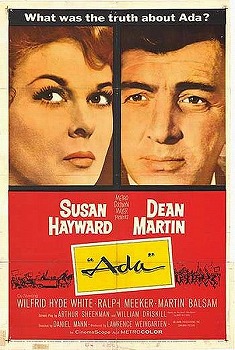This article needs additional citations for verification .(May 2021) |
| Ada | |
|---|---|
 Original film poster | |
| Directed by | Daniel Mann |
| Screenplay by | Arthur Sheekman William Driskill |
| Based on | Ada Dallas 1959 novel by Wirt Williams |
| Produced by | Lawrence Weingarten |
| Starring | Susan Hayward Dean Martin Wilfrid Hyde-White Ralph Meeker Martin Balsam |
| Cinematography | Joseph Ruttenberg |
| Edited by | Ralph E. Winters |
| Music by | Bronislau Kaper |
Production companies | Avon Productions Chalmar Inc. |
| Distributed by | Metro-Goldwyn-Mayer |
Release date |
|
Running time | 109 min. |
| Country | United States |
| Language | English |
| Box office | $1.5 million [1] |
Ada is a 1961 American political drama film produced by Avon Productions and distributed by Metro-Goldwyn-Mayer. It was directed by Daniel Mann and produced by Lawrence Weingarten, with a screenplay by Arthur Sheekman and William Driskill based on the novel Ada Dallas by Wirt Williams.
Contents
The film stars Susan Hayward, Dean Martin, Wilfrid Hyde-White, Ralph Meeker and Martin Balsam.
